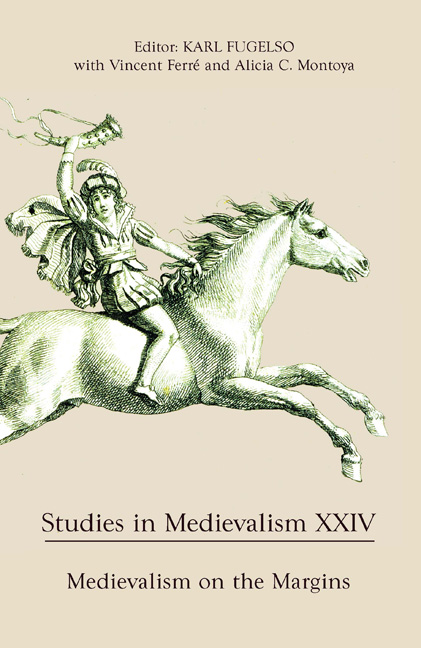Book contents
- Frontmatter
- Acknowledgments
- Contents
- List of Illustrations
- Volume XXIV 2015
- Editorial Note
- I Medievalism on the Margins: Some Perspective(s)
- II Trans-Atlantic Medievalism(s)
- III Other Interpretations
- 13 The Middle Ages Are within Your Grasp: Motor Neurons, Mirror Neurons, Simulacra, and Imagining the Past
- 14 Alfred the Little: Medievalism, Politics, and the Poet Laureate
- 15 Swords, Sorcery, and Steam: The Industrial Dark Ages in Contemporary Medievalism
- 16 Modern-day Ring-givers: MMORPG Guild Cultures and the Influence of the Anglo-Saxon World
- Contributors
13 - The Middle Ages Are within Your Grasp: Motor Neurons, Mirror Neurons, Simulacra, and Imagining the Past
from III - Other Interpretations
Published online by Cambridge University Press: 05 December 2015
- Frontmatter
- Acknowledgments
- Contents
- List of Illustrations
- Volume XXIV 2015
- Editorial Note
- I Medievalism on the Margins: Some Perspective(s)
- II Trans-Atlantic Medievalism(s)
- III Other Interpretations
- 13 The Middle Ages Are within Your Grasp: Motor Neurons, Mirror Neurons, Simulacra, and Imagining the Past
- 14 Alfred the Little: Medievalism, Politics, and the Poet Laureate
- 15 Swords, Sorcery, and Steam: The Industrial Dark Ages in Contemporary Medievalism
- 16 Modern-day Ring-givers: MMORPG Guild Cultures and the Influence of the Anglo-Saxon World
- Contributors
Summary
Today, the Middle Ages might be conveniently defined as the study of the events and artifacts in Europe (more or less) between 500 and 1500 (more or less) that still survive, and our interactions with them. Countless medieval acts of various kinds have been incorporated, and survive as what Bruno Latour has called “actants,” in our present institutions, artifacts, and gestures, but they are so combined with so many other actants that it is impossible to disentangle the medieval actants from the others, and meaningless to do so, since in these cases their value lies not in their historical difference, their “medievality,” but precisely in their having been assimilated into modern institutions, artifacts, and gestures. Certain artifacts have, however, been set off as being “medieval,” which is to say past and other. Some of these artifacts are relatively intact, but the larger and more complex ones – like “medieval” churches – almost never are, having been repaired or transformed over the years. Some of these “medieval” artifacts, like churches, are still in use today for contemporary purposes, which may in some cases be analogous to the purposes for which they were used during the period in which they were created. Relatively few of these “medieval” artifacts are immediately or directly useful today, however, at least for their original purposes, and those that are have almost always been modified or supplemented to serve modern purposes. These “medieval” artifacts have by and large been constituted and preserved as a distinct set of objects on account not of their immediate and practical usefulness but on account of their ability to enrich the present, everyday world and to enable us to see and experience potentialities in our present, everyday world that we would not otherwise see or experience. It would in fact probably be most accurate to say that the Middle Ages, today, are primarily a set of potential actions, thoughts, and feelings that are avail- able to us thanks to the survival of these artifacts.
- Type
- Chapter
- Information
- Studies in Medievalism XXIVMedievalism on the Margins, pp. 155 - 176Publisher: Boydell & BrewerPrint publication year: 2015



